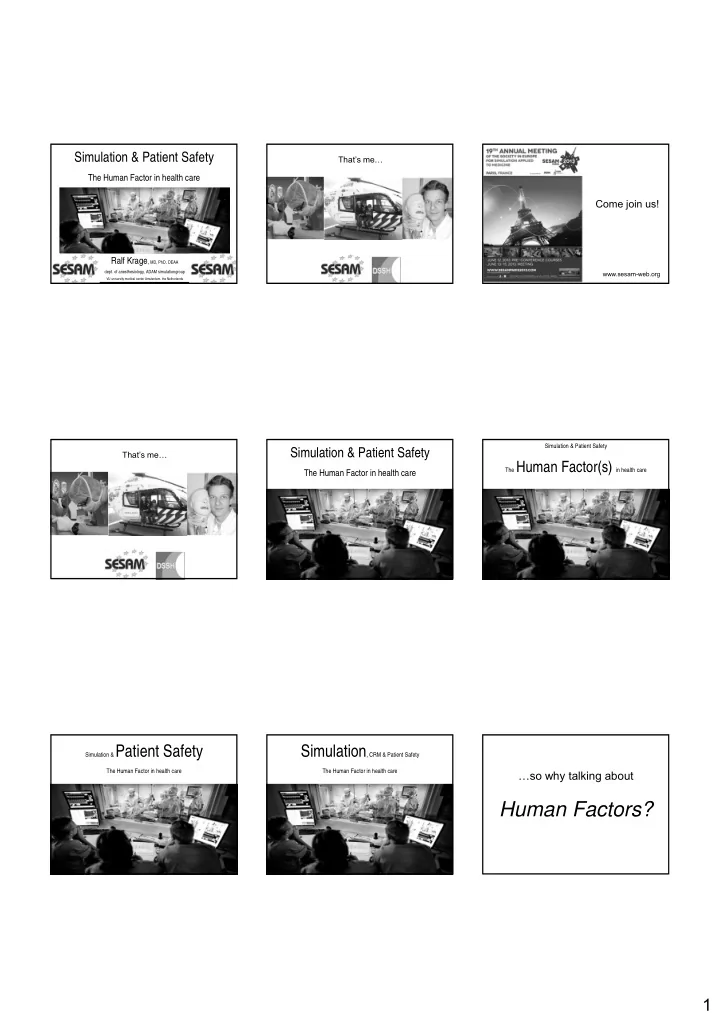

Simulation & Patient Safety That’s me… The Human Factor in health care Come join us! Ralf Krage , MD, PhD, DEAA dept. of anesthesiology, ADAM simulationgroup www.sesam-web.org VU university medical center Amsterdam, the Netherlands Simulation & Patient Safety Simulation & Patient Safety That’s me… The Human Factor(s) in health care The Human Factor in health care Simulation & Patient Safety Simulation , CRM & Patient Safety The Human Factor in health care The Human Factor in health care …so why talking about Human Factors? 1
Causes of incidences in healthcare Building a Safer USA 2000 Institute of Medicine Report 70% due to “ Human Factors ” Health System Top 10 list “ causes of death ” Linda T. Kohn, Janet M. Corrigan, and • Sepsis 100.000-200.000 Molla S. Donaldson, Editors • Medical errors • Traffic 44.000 – 96.000 43.000 • Mamma Ca 42.000 • HIV 16.000 Committee on Quality of Health Care in America To Err Is Human, Building a Safer Health System, INSTITUTE OF MEDICINE LT Kohn, JM Corrigan, and MS Donaldson, Editors Committee on Quality of Health Care in America, Institute of Medicine 2000 2000 Causes of incidences in healthcare Conclusions C risis R esource M anagement (CRM) 70% due to “ Human Factors ” new safety culture Definition Introduction of simulation training no lack of knowledge as often as possible „The ability to translate the rather a problem with the knowledge Crisis Resource Management knowledge of what needs to be done into effective team (CRM) activity in the complex and ill-structured real world of transfer into reality medical treatment“ To Err Is Human, Building a Safer Health System, LT Kohn, JM Corrigan, and MS Donaldson, Editors Teamwork / Communication Committee on Quality of Health Care in America, Institute of Medicine 2000 David Gaba, Stanford M.Rall M.Rall human factors Human Factors – more than communication... 16 2
human factors human factors human factors time time time fatigue fatigue pressure pressure pressure external distractions human factors Human Factors – more than communication... Human Factors – more than communication... time fatigue pressure decision making situation awareness individual, cognitive aids cognitive elements anticipation & plan ahead external personal fixation error distractions issues individual elements Human Factors – more than communication... decision making situation awareness cognitive aids team management anticipation & plan ahead fixation error individual elements 3
Human Factors – more than communication... decision making safety culture training culture situation awareness leadership / followership cognitive aids “ effective ” communication anticipation & plan ahead distribute the workload … … individual elements team management Simulation in Health Care How? 31 32 Anesthesia simulation – ADAM simulationgroup, VUmc Amsterdam Simulation: One word… Simulation: One word… Laparoscopic CRM teamtraining tasktraining 4
Anesthesia simulation – ADAM simulationgroup, VUmc Amsterdam Anesthesia simulation – ADAM simulationgroup, VUmc Amsterdam Anesthesia simulation – ADAM simulationgroup, VUmc Amsterdam TEAM simulation – ADAM simulationgroup, VUmc Amsterdam TEAM simulation – ADAM simulationgroup, VUmc Amsterdam video debriefing In-situ simulation Train the teams who work together! CRM key principles Leadership Does simulation work? 1. Know the environment 9. prevent/manage fixation error Communication 2. Anticipate and plan 10. cross (double) check 3. Call for help early 11. use cognitive aids 4. Exercise leadership 12. re-evaluate repeatedly Decision making 5. Distribute the workload 13. use good teamwork CRM key principles 6. Mobilize all resource 14. allocate attention wisely 1. Know the environment 9. prevent/manage fixation error 7. Communicate effectively 15. set priorities dynamically 2. Anticipate and plan Situation awareness 10. cross (double) check 3. Call for help early 11. use cognitive aids 8. Use all available info 4. Exercise leadership 12. re-evaluate repeatedly 5. Distribute the workload 13. use good teamwork 6. Mobilize all resource 14. allocate attention wisely 7. Communicate effectively 15. set priorities dynamically Gaba, Rall In: Miller, Anesthesia 6th edition 8. Use all available info 5
Does it (simulation) work? Simulation improves Simulation-Team-Training teamperformance!!! “...no industry in which human lives depend on the skilled performance of responsible operators has waited for unequivocal proof of the benefits of simulation (or CRM) before embracing it... Neither should anesthesiology (health care)” We can ´ t wait any longer ! David Gaba, Anesthesiology 76:491-494, 1992 Medical Team Simulation – Medical Team Simulation – to improve patient safety! to improve patient safety! • Human Factor issues (still) play an important role in health care / patient safety Medical Team Simulation – Medical Team Simulation – Medical Team Simulation – to improve patient safety! to improve patient safety! to improve patient safety! • Human Factor issues (still) play an important role • Human Factor issues (still) play an important role • Human Factor issues (still) play an important role in health care / patient safety in health care / patient safety in health care / patient safety • ... and can / should be trained (training culture!!!) • ... and can / should be trained (training culture!!!) • ... and can / should be trained (training culture!!!) • Team Simulation is a very powerful teaching tool • Team Simulation is a very powerful teaching tool • ... and it improves teamperformances! 6
Let‘s wake up! Come join us! …to H uman F actors in medicine www.sesam-web.org IMSH 2013 Большое спасибо ! Contact: January 26-30, 2013 Peabody Hotel, Orlando, Florida, USA thank you very much Ralf Krage, MD, PhD, DEAA dept. of anesthesiology / ADAM simulation group VU university medical center hartstikke bedankt De Boelelaan 1117 1081 HV Amsterdam, the Netherlands IMSH 2013 Planning Committee Co-chairs: Adam Cheng, MD, FRCPC, FAAP Ralf Krage, MD, DEAA KT Waxman, DNP, MBA, RN, CNL mail: r.krage@vumc.nl vielen Dank phone: 00316 34605400 (mobile) To register visit https://ssih.org 7
Recommend
More recommend